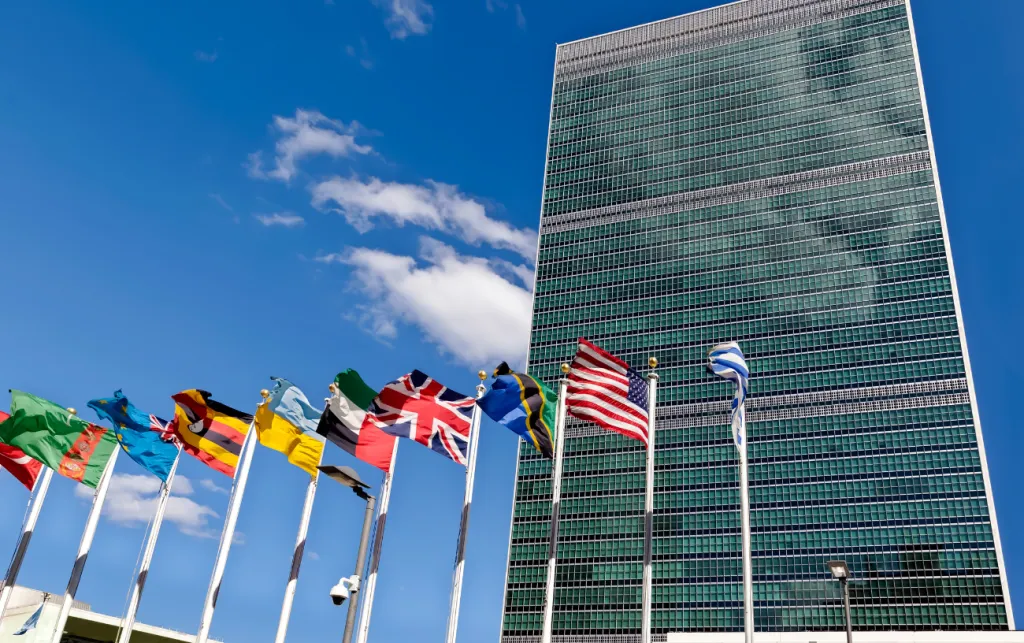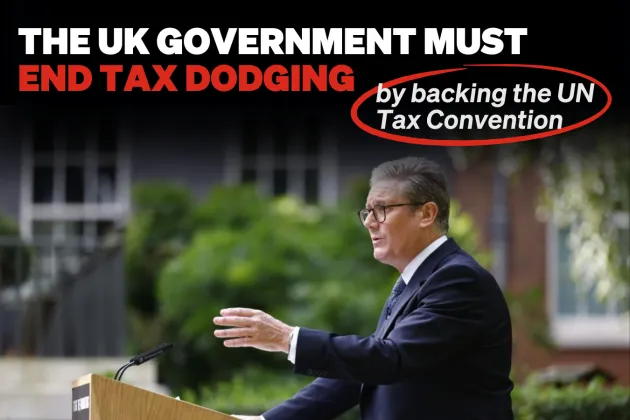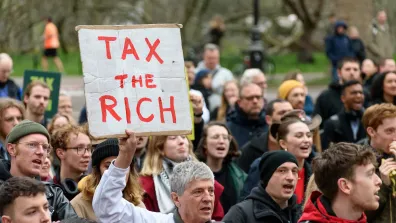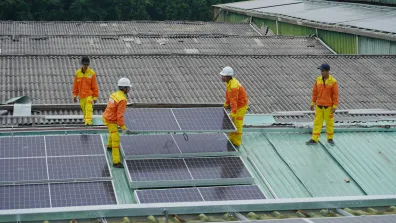Tackling tax dodging: the UN Tax Convention

The wealth of the big corporations and the super-rich is exploding – but much of this wealth is not being taxed. £388 billion was lost to tax dodging last year – and the UK is responsible for over £102 billion of this1.
Meanwhile, the climate crisis worsens and inequality skyrockets. We need money to deal with these crises – which negotiators at the United Nations are currently hashing out a game-changing proposal to get.
The UN Tax Convention is a rare chance to tackle tax dodging, rebalance power in the global economy and make big corporations and the super-rich pay their fair share. While details are still being negotiated, it is likely to include measures making corporate tax dodging much easier to spot – and could potentially enable wealth taxes on the super-rich, and carbon taxes to make big polluters pay for their climate-wrecking actions.
The vast majority of the world’s countries are on board with the proposal. But the UK, along with eight other countries2, are refusing to fully back the Convention. It’s time for the UK to get on board, or risk being left behind.
The UK’s urgent need for cash
The UK government is facing many competing spending priorities. NHS: crumbling. Public sector pay: slashed. Schools: underfunded. Local authorities' budgets: shrinking. Benefits: inadequate. Cost of living: still extortionate. Tuition fees: higher than ever.
The impact of austerity will take time, and a lot of public money, to fix.
Meanwhile, the climate crisis demands huge investment to transition our economy, shift to green energy, decarbonise our transport system, insulate homes, and move away, once and for all, from volatile fossil fuels – while supporting workers and communities reliant on high- carbon industries. This transition must centre justice – i.e. a just transition – and challenge existing inequalities – rather than exacerbating them.
Crucially, the UK and other rich countries – whose wealth was built on burning climate-wrecking fossil fuels – need to support the Global South to tackle the climate crisis they didn’t create.
Global South countries face the double burden of coping with ecological catastrophes, while also developing their economies to raise living standards and guarantee dignified lives for all. Climate justice groups estimate the money needed is at least $5 trillion (£3.1 trillion).
Tax the super-rich
However, there is the cash out there to deal with these crises. But instead of being paid in tax, it’s stashed in super-yachts, offshore bank accounts, and the boardrooms of multinational corporations. The challenge is how to end tax dodging, and make the super-rich pay their fair share.
The Prime Minister has in the past promised to clamp down on tax avoidance. The government has provided extra money to help HMRC combat tax dodging, after the previous Conservative government slashed the department. However, that won’t be enough to end rampant tax dodging.
Acting alone, the UK can only do so much to claw back lost tax revenue. Big corporations and billionaires can call upon an army of accountants, lawyers and financial service experts to help them hide their wealth behind opaque shell companies and shift their profits to tax havens across the world.
Tax dodging is an international problem and requires an international solution. If the government is serious about tackling tax abuse by big corporations and the super-rich, it needs to start backing the UN Tax Convention.
What is the solution to tax dodging?
In November 2023, the United Nations General Assembly voted for a game-changing resolution to develop a UN Tax Convention: a rare chance to tackle tax dodging worldwide and rebalance power in the global economy.
The details are still being negotiated, but the Convention will agree new rules on how countries tax corporations and create a forum to strengthen these rules in the future.
At a minimum, it could introduce financial transparency measures that make it easier to spot tax dodging – such as publishing where companies are making profits and paying taxes, and who owns and profits from those companies.
But there are proposals on the table that go much further: wealth taxes on the super-rich, minimum tax rates for multinational companies, and carbon taxes to make big polluters pay for their climate-wrecking emissions.
Crucially, the UN Tax Convention will be binding upon its signatories. And with the vast majority of countries backing it, that means any company operating in one of those countries could be taxed in line with the Convention.
Importantly, the process is being led by countries in the Global South, which have historically been shut out of decision-making on tax and the global economy. The Organisation for Economic Co-operation and Development (OECD), which has set international tax rules for decades, is dominated by rich Global North countries.
By shifting governance back to the United Nations, the UN Tax Convention will make it possible for more countries to participate in global economic rule-setting. And by working to strengthen it, the UK can show itself to be on the side of global economic justice.

Britain’s dodgy reputation
From Bermuda to Jersey to the City of London, the UK and its overseas territories are responsible for around a third of corporate tax dodging globally3. Meanwhile, many of the tax lawyers and accountants working to enable tax dodging have offices in the heart of London.
For the UK government, the UN Tax Convention offers an opportunity to gain credibility on the international stage and shake off Britain’s reputation as an enabler of ‘dirty money’.
By championing it now, the government can demonstrate commitment to a fair and transparent global tax regime. With the US government under President Donald Trump waging war on international cooperation, and the political direction of the EU uncertain, the UK could play a vital role in working with Global South countries to support this bold, international treaty.
The cost of inaction
In 2022, Amazon paid £0 in UK taxes. Each year, around $1 trillion of corporate profit is hidden in tax havens. Meanwhile, public services collapse, real-term wages drop, and the climate crisis intensifies.
The government must tax corporations and the ultra-rich to tackle poverty and fund action on the climate crisis. The money gained through a UN Tax Convention can pay for schools, hospitals, museums and community centres. It can end unjust poverty in the Global South. And it can build a global renewable energy system that brings down our bills, cleans up our air and helps us tackle the climate crisis.
Backing a strong UN Tax Convention is a simple first step towards this future.
This article was originally published on 14 August 2024. It was updated on 25 February 2025.



